Module 12 Help Unit 1 What should we do before help arrives课件(共27张PPT)+内嵌音频
文档属性
| 名称 | Module 12 Help Unit 1 What should we do before help arrives课件(共27张PPT)+内嵌音频 | 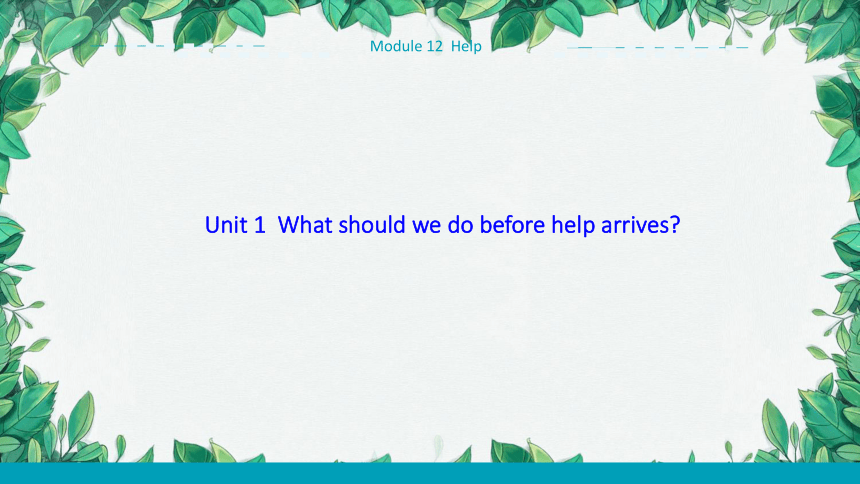 | |
| 格式 | pptx | ||
| 文件大小 | 5.0MB | ||
| 资源类型 | 教案 | ||
| 版本资源 | 外研版 | ||
| 科目 | 英语 | ||
| 更新时间 | 2023-07-18 13:49:49 | ||
图片预览

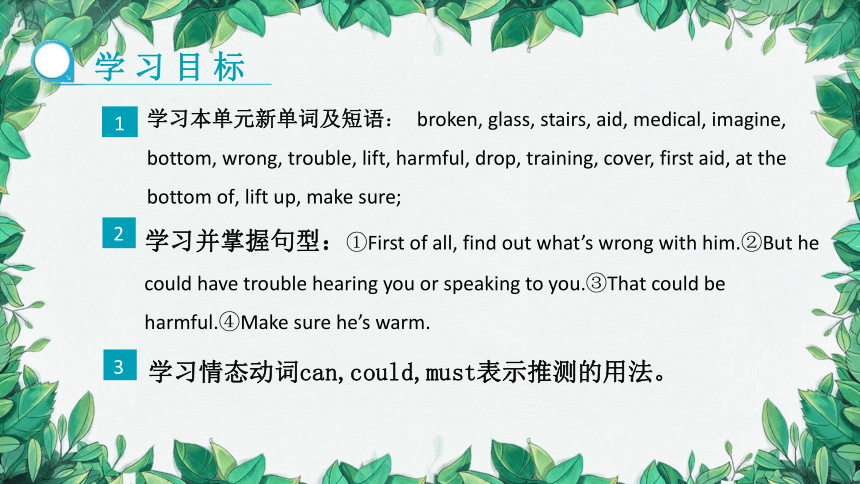
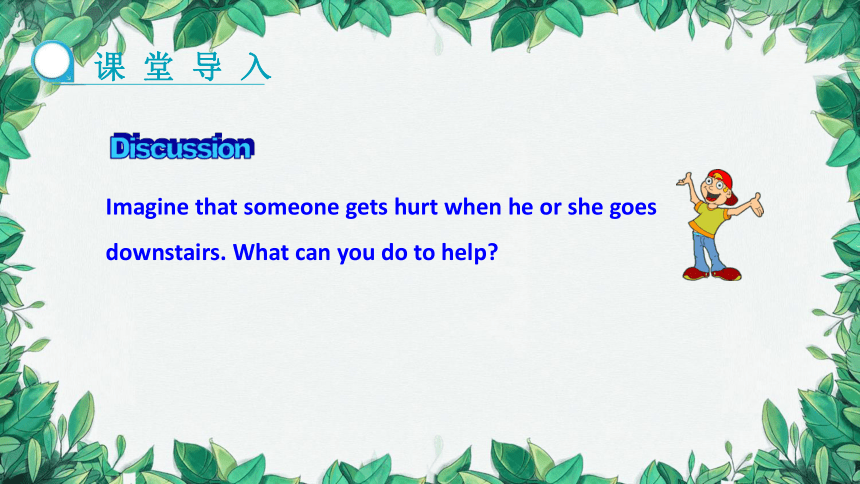
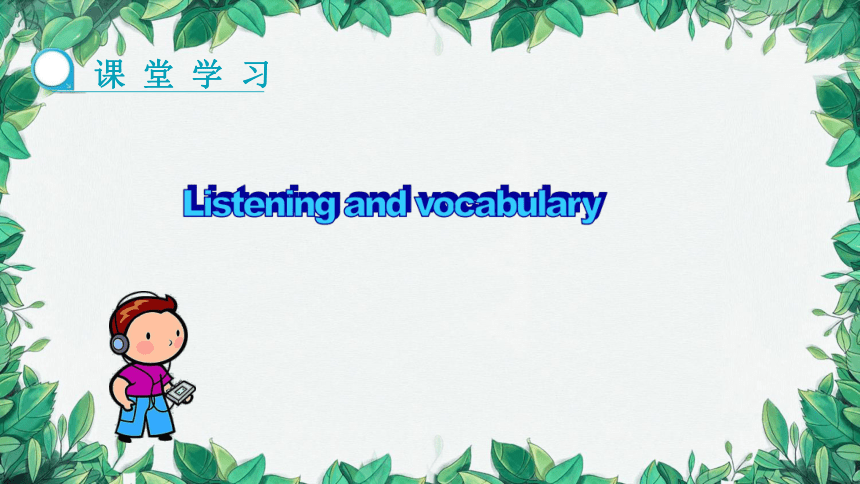
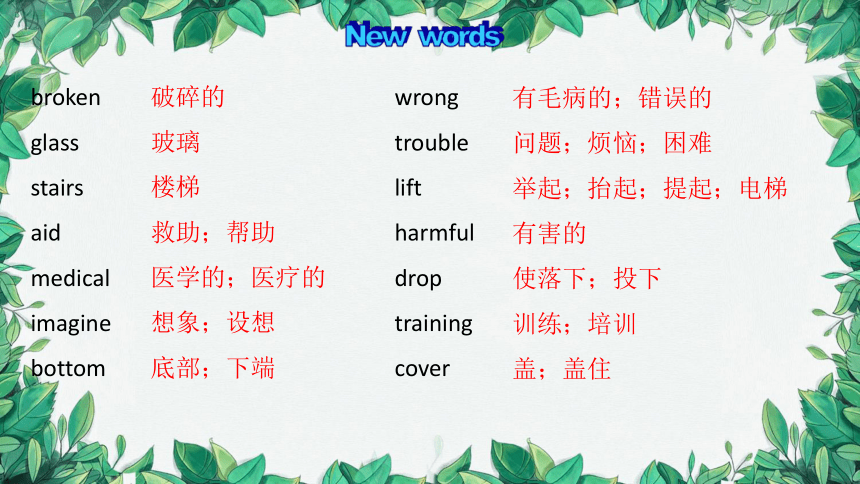
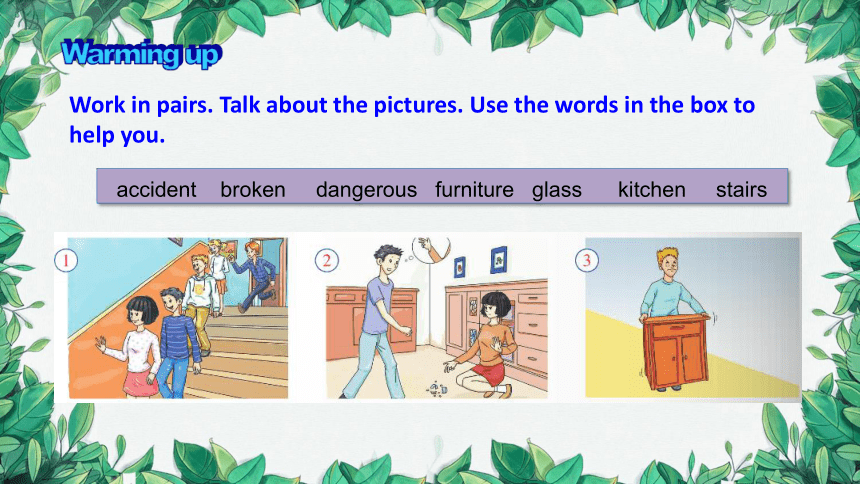
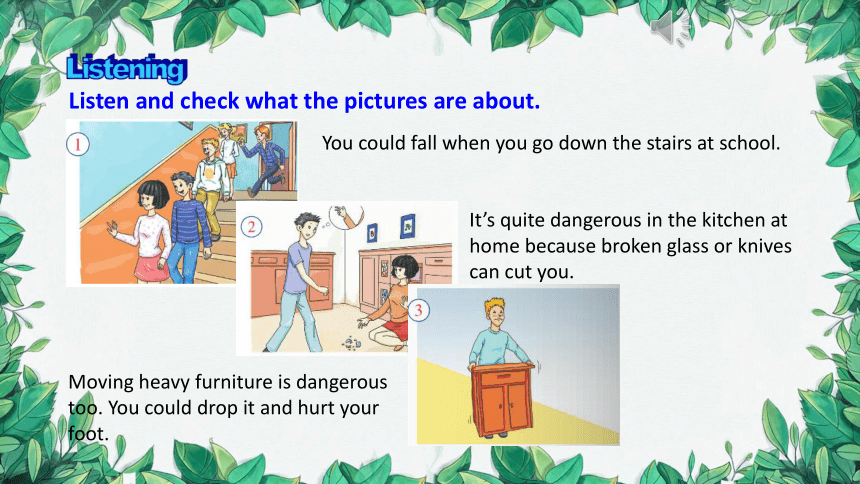
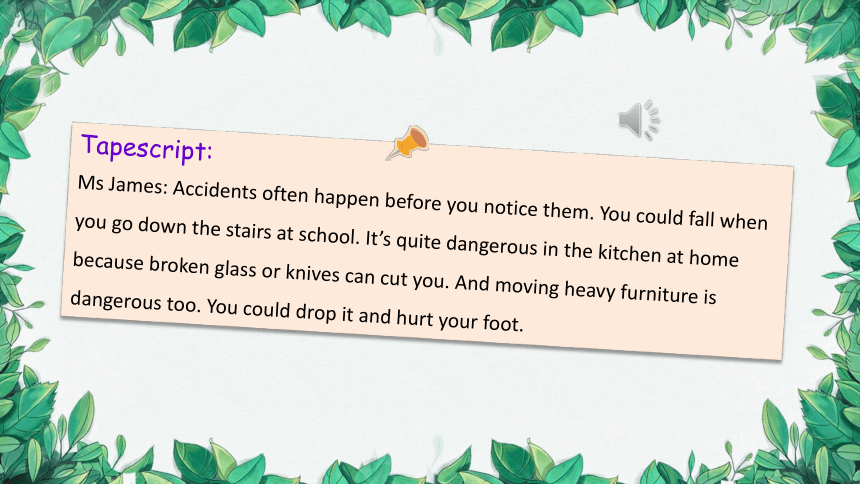
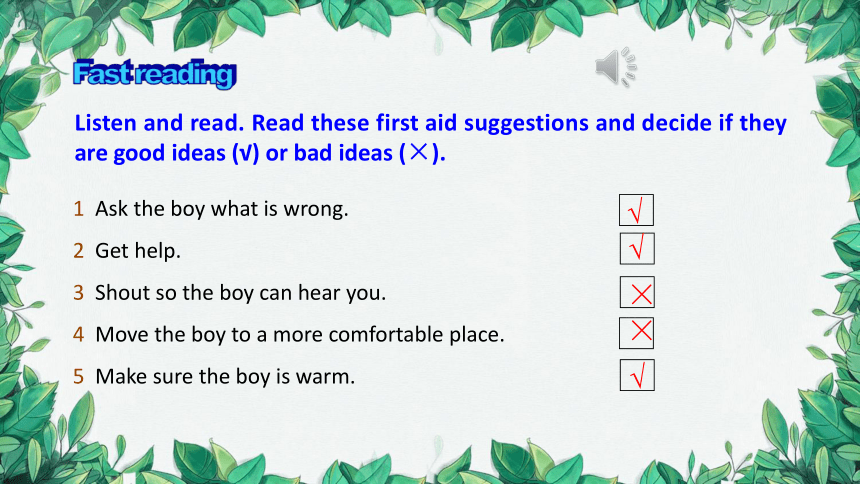
文档简介
(共27张PPT)
Unit 1 What should we do before help arrives
Module 12 Help
学 习 目 标
学习本单元新单词及短语: broken, glass, stairs, aid, medical, imagine, bottom, wrong, trouble, lift, harmful, drop, training, cover, first aid, at the bottom of, lift up, make sure;
1
3
学习情态动词can,could,must表示推测的用法。
学习并掌握句型:①First of all, find out what’s wrong with him.②But he could have trouble hearing you or speaking to you.③That could be harmful.④Make sure he’s warm.
2
课 堂 导 入
Discussion
Imagine that someone gets hurt when he or she goes downstairs. What can you do to help
Listening and vocabulary
课 堂 学 习
New words
broken
glass
stairs
aid
medical
imagine
bottom
wrong
trouble
lift
harmful
drop
training
cover
破碎的
玻璃
楼梯
救助;帮助
医学的;医疗的
想象;设想
底部;下端
有毛病的;错误的
问题;烦恼;困难
举起;抬起;提起;电梯
有害的
使落下;投下
训练;培训
盖;盖住
Work in pairs. Talk about the pictures. Use the words in the box to help you.
accident broken dangerous furniture glass kitchen stairs
Warming up
Listen and check what the pictures are about.
Listening
You could fall when you go down the stairs at school.
It’s quite dangerous in the kitchen at home because broken glass or knives can cut you.
Moving heavy furniture is dangerous too. You could drop it and hurt your foot.
Tapescript:
Ms James: Accidents often happen before you notice them. You could fall when you go down the stairs at school. It’s quite dangerous in the kitchen at home because broken glass or knives can cut you. And moving heavy furniture is dangerous too. You could drop it and hurt your foot.
1 Ask the boy what is wrong.
2 Get help.
3 Shout so the boy can hear you.
4 Move the boy to a more comfortable place.
5 Make sure the boy is warm.
Listen and read. Read these first aid suggestions and decide if they are good ideas (√) or bad ideas (×).
×
√
Fast reading
√
√
×
1. Read the conversation and complete the sentences.
Careful reading
How to do first aid
wrong
120
comfortable
lift
sit
warm
Cover
help
急救
在……的底部
处于疼痛之中
发现;弄清
first aid
at the bottom of
in pain
find out
have trouble doing sth.
shout for help
lift up
make sure
cover … with…
basic medical training
做某事有困难
呼救
抬起;提起
确保;确认
2. Translate the following phrases into Chinese.
用……把……盖上
基本医护训练
Complete the passage with the words in the box.
Let's (1) _________ you see a boy lying at the (2) _________ of the stairs. What should we do Call for(3)________ help immediately. Do not (4)_____ the boy up and sit him on a chair. This could be (5)__________ for him. Even worse, you might (6)______ him while you are moving him! That would cause a lot of (7) ______ . (8)______ him with a coat and make sure he is warm. Then wait for the doctors to arrive.
imagine
bottom
medical
lift
harmful
drop
pain
Cover
Post-reading
bottom Cover drop harmful imagine lift medical pain
What can we do to…
How do we do that
How can we do that
Everyday English
Language points
1. broken破碎的
broken形容词,意为“破碎的”,可以在连系动词之后作表语,也可以在名词之前作定语。
My cup was broken. I want to buy a new one.
我人杯子破了,我想买一只新的。
The box was full of broken glass.
盒子里装满了碎玻璃。
[拓展]
break动词,意为“(使)破碎”,其过去式为broke,过去分词为broken。
Who broke the window
是谁把窗户打破了?
2. Let’s imagine an accident. 让我们想象一起事故。
imagine动词,意为“想象,设想”。
(1) imagine +名词/代词
Can you imagine life without power
你能想象一下没有电的生活吗?
(2) imagine + v.-ing
She imagined playing the piano of her own.
她想象弹奏自己的钢琴。
(3) imagine + that从句
Imagine that you are walking in the forest alone.
设想你正独自一人在森林里散步。
3. First of all, find out what’s wrong with him. 首先,弄清楚他怎么了。
What’s wrong with… 相当于What’s the matter/trouble with… 常用来询问某人怎么了或某物出了什么问题。
--- What’s wrong with you, Jack 杰克,你怎么了?
--- I’ve got a headache. 我头疼。
What’s wrong with your bike
你的自行车出了什么故障?
4. But he could have trouble hearing you or speaking to you. 但是他有可能难以听到你(说话)或者和你说话。
have trouble (in) doing sth.意为“做某事有困难”,相当于have problem (in) doing sth.。trouble在此用作不可数名词,意为“困难;麻烦;问题”。
Little Tom had trouble walking.
小汤姆走路有困难。
Do you have any trouble learning English
你学习英语有困难吗?
[拓展]
have trouble with…表示“在某方面有困难”。
At first, they had great trouble with the language.
开始的时候,他们在语言方面面临很大的困难。
5. No, that could be harmful!不行,那可能会造成伤害!
harmful形容词,意为“有害的”,尤指对环境或健康有害处。be harmful to意为“对……有害处”。
Smoking is harmful to our health. Give it up.
吸烟对我们的健康有害处,戒烟吧。
[拓展]
(1) harm作动词,意为“伤害;损害”。
She didn’t want to harm anyone.
她原本不想伤害任何人。
(2) harm作名词,意为“伤害;损害”,do harm to 是固定短语,意为“对……构成伤害”。
Air pollution does harm to our environment.
空气污染对我们的环境造成伤害。
6. Make sure he’s warm. 确保他不受凉。
make sure意为“确保;确认”。
(1) make sure of sth.
Please make sure the time and place of the meeting.
请确认一下会议的时间和地点。
(2) make sure +that从句
Check your answers and make sure there are no mistakes.
检查你的答案,确保没有错误。
7. That’s such good advice that you could be a doctor, Betty! 这个建议非常好,你都可以当医生了!
(1) such… that…意为“如此……以至……”。such是形容词,后接名词(短语)。
It was such a cold day that there were few people in the street.
天气如此冷,以至于大街上几乎没有几个人。
辨析:such…that…与 so…that…
such …that…和so…that…都可以引导结果状语从句,但用法不同。
such…that… ①such +a/ an +形容词 + 可数名词单数+that…
②such+形容词 +可数名词复数+that…
③such+形容词 + 不可数名词+that…
so…that… ①so +形容词/副词 + that…
②so+形容词+ a / an + 可数名词单数+that…
He’s so young that he can’t go to school.
= He’s such a young boy that he can’t go to school.
他如此小,不能去上学。
(2) advice不可数名词,意为“建议;意见”,其动词形式为advise,意为“建议”,advise sb. to do sth.表示“建议某人做某事”。
Mr Smith gave me some advice on learning English.
史密斯先生给我了一些学习英语的建议。
My American pen friend advised me to read English newspapers every day.
我的美国笔友建议我每天读英文报纸。
Pronunciation and speaking
1.Listen and underline the words the speaker stresses.
1 Let's imagine an accident.
2 What can we do to help him
3 Find out what's wrong with him.
4 Make sure he's warm.
5 Cover him with a coat.
Now listen again and repeat.
2. Work in pairs. Ask and answer questions.
Student A: You are a teacher of basic medical training.
Student B: You are a student of basic medical training.
—What do you do if someone's hurt
—Ask him/her what happened...
1. Read the conversation.
2. Talk with your partner about first aid.
Homework
Thank you !
Unit 1 What should we do before help arrives
Module 12 Help
学 习 目 标
学习本单元新单词及短语: broken, glass, stairs, aid, medical, imagine, bottom, wrong, trouble, lift, harmful, drop, training, cover, first aid, at the bottom of, lift up, make sure;
1
3
学习情态动词can,could,must表示推测的用法。
学习并掌握句型:①First of all, find out what’s wrong with him.②But he could have trouble hearing you or speaking to you.③That could be harmful.④Make sure he’s warm.
2
课 堂 导 入
Discussion
Imagine that someone gets hurt when he or she goes downstairs. What can you do to help
Listening and vocabulary
课 堂 学 习
New words
broken
glass
stairs
aid
medical
imagine
bottom
wrong
trouble
lift
harmful
drop
training
cover
破碎的
玻璃
楼梯
救助;帮助
医学的;医疗的
想象;设想
底部;下端
有毛病的;错误的
问题;烦恼;困难
举起;抬起;提起;电梯
有害的
使落下;投下
训练;培训
盖;盖住
Work in pairs. Talk about the pictures. Use the words in the box to help you.
accident broken dangerous furniture glass kitchen stairs
Warming up
Listen and check what the pictures are about.
Listening
You could fall when you go down the stairs at school.
It’s quite dangerous in the kitchen at home because broken glass or knives can cut you.
Moving heavy furniture is dangerous too. You could drop it and hurt your foot.
Tapescript:
Ms James: Accidents often happen before you notice them. You could fall when you go down the stairs at school. It’s quite dangerous in the kitchen at home because broken glass or knives can cut you. And moving heavy furniture is dangerous too. You could drop it and hurt your foot.
1 Ask the boy what is wrong.
2 Get help.
3 Shout so the boy can hear you.
4 Move the boy to a more comfortable place.
5 Make sure the boy is warm.
Listen and read. Read these first aid suggestions and decide if they are good ideas (√) or bad ideas (×).
×
√
Fast reading
√
√
×
1. Read the conversation and complete the sentences.
Careful reading
How to do first aid
wrong
120
comfortable
lift
sit
warm
Cover
help
急救
在……的底部
处于疼痛之中
发现;弄清
first aid
at the bottom of
in pain
find out
have trouble doing sth.
shout for help
lift up
make sure
cover … with…
basic medical training
做某事有困难
呼救
抬起;提起
确保;确认
2. Translate the following phrases into Chinese.
用……把……盖上
基本医护训练
Complete the passage with the words in the box.
Let's (1) _________ you see a boy lying at the (2) _________ of the stairs. What should we do Call for(3)________ help immediately. Do not (4)_____ the boy up and sit him on a chair. This could be (5)__________ for him. Even worse, you might (6)______ him while you are moving him! That would cause a lot of (7) ______ . (8)______ him with a coat and make sure he is warm. Then wait for the doctors to arrive.
imagine
bottom
medical
lift
harmful
drop
pain
Cover
Post-reading
bottom Cover drop harmful imagine lift medical pain
What can we do to…
How do we do that
How can we do that
Everyday English
Language points
1. broken破碎的
broken形容词,意为“破碎的”,可以在连系动词之后作表语,也可以在名词之前作定语。
My cup was broken. I want to buy a new one.
我人杯子破了,我想买一只新的。
The box was full of broken glass.
盒子里装满了碎玻璃。
[拓展]
break动词,意为“(使)破碎”,其过去式为broke,过去分词为broken。
Who broke the window
是谁把窗户打破了?
2. Let’s imagine an accident. 让我们想象一起事故。
imagine动词,意为“想象,设想”。
(1) imagine +名词/代词
Can you imagine life without power
你能想象一下没有电的生活吗?
(2) imagine + v.-ing
She imagined playing the piano of her own.
她想象弹奏自己的钢琴。
(3) imagine + that从句
Imagine that you are walking in the forest alone.
设想你正独自一人在森林里散步。
3. First of all, find out what’s wrong with him. 首先,弄清楚他怎么了。
What’s wrong with… 相当于What’s the matter/trouble with… 常用来询问某人怎么了或某物出了什么问题。
--- What’s wrong with you, Jack 杰克,你怎么了?
--- I’ve got a headache. 我头疼。
What’s wrong with your bike
你的自行车出了什么故障?
4. But he could have trouble hearing you or speaking to you. 但是他有可能难以听到你(说话)或者和你说话。
have trouble (in) doing sth.意为“做某事有困难”,相当于have problem (in) doing sth.。trouble在此用作不可数名词,意为“困难;麻烦;问题”。
Little Tom had trouble walking.
小汤姆走路有困难。
Do you have any trouble learning English
你学习英语有困难吗?
[拓展]
have trouble with…表示“在某方面有困难”。
At first, they had great trouble with the language.
开始的时候,他们在语言方面面临很大的困难。
5. No, that could be harmful!不行,那可能会造成伤害!
harmful形容词,意为“有害的”,尤指对环境或健康有害处。be harmful to意为“对……有害处”。
Smoking is harmful to our health. Give it up.
吸烟对我们的健康有害处,戒烟吧。
[拓展]
(1) harm作动词,意为“伤害;损害”。
She didn’t want to harm anyone.
她原本不想伤害任何人。
(2) harm作名词,意为“伤害;损害”,do harm to 是固定短语,意为“对……构成伤害”。
Air pollution does harm to our environment.
空气污染对我们的环境造成伤害。
6. Make sure he’s warm. 确保他不受凉。
make sure意为“确保;确认”。
(1) make sure of sth.
Please make sure the time and place of the meeting.
请确认一下会议的时间和地点。
(2) make sure +that从句
Check your answers and make sure there are no mistakes.
检查你的答案,确保没有错误。
7. That’s such good advice that you could be a doctor, Betty! 这个建议非常好,你都可以当医生了!
(1) such… that…意为“如此……以至……”。such是形容词,后接名词(短语)。
It was such a cold day that there were few people in the street.
天气如此冷,以至于大街上几乎没有几个人。
辨析:such…that…与 so…that…
such …that…和so…that…都可以引导结果状语从句,但用法不同。
such…that… ①such +a/ an +形容词 + 可数名词单数+that…
②such+形容词 +可数名词复数+that…
③such+形容词 + 不可数名词+that…
so…that… ①so +形容词/副词 + that…
②so+形容词+ a / an + 可数名词单数+that…
He’s so young that he can’t go to school.
= He’s such a young boy that he can’t go to school.
他如此小,不能去上学。
(2) advice不可数名词,意为“建议;意见”,其动词形式为advise,意为“建议”,advise sb. to do sth.表示“建议某人做某事”。
Mr Smith gave me some advice on learning English.
史密斯先生给我了一些学习英语的建议。
My American pen friend advised me to read English newspapers every day.
我的美国笔友建议我每天读英文报纸。
Pronunciation and speaking
1.Listen and underline the words the speaker stresses.
1 Let's imagine an accident.
2 What can we do to help him
3 Find out what's wrong with him.
4 Make sure he's warm.
5 Cover him with a coat.
Now listen again and repeat.
2. Work in pairs. Ask and answer questions.
Student A: You are a teacher of basic medical training.
Student B: You are a student of basic medical training.
—What do you do if someone's hurt
—Ask him/her what happened...
1. Read the conversation.
2. Talk with your partner about first aid.
Homework
Thank you !
同课章节目录
- Module 1 How to learn English
- Unit 1 Let's try to speak English as much as possi
- Unit 2 You should smile at her.
- Unit 3 Language in use .
- Module 2 My home town and my country
- Unit 1 It's taller than many other buildings.
- Unit 2 Cambridge is a beautiful city in the east o
- Unit 3 Language in use .
- Module 3 Sports.
- Unit 1 Nothing is more exciting than playing tenni
- Unit 2 This year we training more carefully.
- Unit 3 Language in use .
- Module 4 Planes, ships and trains .
- Unit 1 He lives the farthest from school.
- Unit 2 What is the best way to travel.
- Unit 3 Language in use .
- Module 5 Lao She Teahouse.
- Unit 1 I wanted to see the Beijing Opera.
- Unit 2 It descibes the changes in Chinese society.
- Unit 3 Language in use .
- Module 6 Animals in danger.
- Unit 1 It allows people to get closer to them .
- Unit 2 The WWF is working hard to save them all.
- Unit 3 Language in use .
- Revision module A
- Module 7 A famous story
- Unit 1 Alice was sitting with her sister by the ri
- Unit 2 She was thinking about her cat.
- Unit 3 Language in use .
- Module 8 Accidents
- Unit 1 While the car were changing to red, a car s
- Unit 2 I was trying to pick it up when it bite me
- Unit 3 Language in use .
- Module 9 Population
- Unit 1 The population of China is about 1.37 billi
- Unit 2 Arnwick was a city with 200,000 people.
- Unit 3 Language in use .
- Module 10 The weathe
- Unit 1 It might snow.
- Unit 2 The weather is fine all year round.
- Unit 3 Language in use .
- Module 11 Way of life
- Unit 1 In China ,we open a gift later.
- Unit 2 In England, you usually drink tea with milk
- Unit 3 Language in use .
- Module 12 Help
- Unit 1 What should we do before help arrives?
- Unit 2 Stay away from windows and heavy furniture.
- Unit 3 Language in use .
- Revision module B
